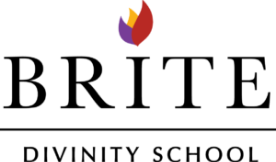Sarah Hurwitz Calls Jews to Know Their History at 28th Annual Gates of Chai Lectureship
Brite Divinity School hosts conversation on the history of Jewish traditions, October 7, antisemitism, and more

From left to right – Rabbi Emeritus Ralph Mecklenburger of the Reform Temple Beth-El joins “As a Jew” author Sarah Hurwitz with Rev. Dr. Stephen Cady, President of Brite Divinity School, for a discussion of Jewish traditions, antisemitism, and more during the 28th Annual Gates of Chai Lectureship in Contemporary Judaism.
For the 28th year, the Jewish Studies Department of Brite Divinity School presented the annual Gates of Chai Lectureship in Contemporary Judaism, an interfaith community event that encourages connection and conversation amongst Fort Worth’s diverse faith communities. Wednesday night’s event featured a panel discussion with the former White House-speechwriter-turned-author Sarah Hurwitz, alongside Rev. Dr. Stephen Cady, President of Brite Divinity School; and Rabbi Emeritus Ralph Mecklenburger of the Reform Temple Beth-El congregation. During the conversation, the panel discussed how Hurwitz rediscovered Jewish traditions in her mid-30s, what it means to be a great person, antisemitism, and more.
In her debut book, “Here All Along,” Hurwitz recounts her reintroduction to Judaism while serving as a speechwriter for President Barack Obama and First Lady Michelle Obama. Through an Introduction to Judaism class, she discovered a rich, complex tradition with a radical, counter-cultural message. All moral traditions – Judaism, Christianity, Islam, Hindu and more – can teach us how to be better people if we deeply and intelligently engage with them, she said.
“What I found in Judaism is that Jewish law, really, demands a much higher standard of ethical behavior from me,” she said.
The bar for being a good person is easily attainable, she said, as long as people do no harm. But her renewed faith tasked her to be better by transforming her life from the way she spoke, the way she lived, and the way she saw the world. “I am not perfect. But I’m a little bit better. I pause a bit more often. It actually makes me think before I open my mouth,” Hurwitz said.
In Hurwitz’s latest book, “As A Jew: Reclaiming Our Story from Those Who Blame, Shame, and Try to Erase Us,” she tracks the history of antisemitism and how it has shaped Jewish identities. As a child, she understood antisemitism to be “this mysterious eternal force in the Universe,” she said. But in researching this book, she found antisemitism to be rooted in 2000 years of Christian anti-Judaism, which routinely depicted Jews as powerful, depraved, and dangerous when in a conspiracy.
Hurwitz began writing “As a Jew” before the October 7 attack, where a Hamas-led militia launched a coordinated attack in Southern Israel, resulting in 1,200 deaths and 251 people abducted. In the two years since the attack, the Israel/Hamas War has been riddled with controversy in the global community from reported human rights violations in Gaza, to the rise of antisemitism on college campuses.
In “As a Jew,” Hurwitz recounted some of the challenges Jewish college students faced in the months following October 7. Many of the colleges she visited likened supporting Israel to supporting Nazis or the KKK, leaving Jewish students silenced and pressured to denounce Israel or risk being harassed and ostracized. Students perceived this rhetoric as anti-Zionist, not antisemitic. But to Hurwitz, it’s antisemitism doing what antisemitism does: evolving for a new generation.
Ben Alford, a Brite Divinity student, wished Hurwitz remarks also considered the voices of Jewish students who’ve been critical of Israel. “While I don’t think the speaker is wrong at all, there was a slight patronization of younger Jews who are more critical of the Israeli government,” he said.
“I believe we should be shooting for more inter-religious dialogue. I think, especially considering October 7, now is the time for Jewish, Christian, Muslim, Hindu – all religious groups – to come together around shared principles about the liberation of people, about the will of the divine being a liberative one, regardless of how you understand it.”
The conversation was uncomfortable at times, but that discomfort, Hurwitz said, was an opportunity for growth. Historically, American Jews have focused so much on fitting in and trying to be like everyone else, she said, but now is the time for Jews to learn their history and to not to be afraid of being different.
“To be a Jew is to be different, and to be different is to be uncomfortable. Comfort is not the Jewish mission in the world,” she said. “We can’t fight antisemitism when we don’t even know the Jewish story. And I think we need to know this story because I think our difference matters to the world, just like I think Christians and Muslims and Buddhists and Hindus and people of all backgrounds matter.”
The Annual Gates of Chai Lectureship in Contemporary Judaism promotes informed, dynamic public dialogue and education on issues of relevance in contemporary Judaism. It is endowed through the generosity of Gates of Chai, Inc., in memory of Larry Kornbleet, and those family members of Stanley and Maria Kornbleet Kurtz who perished in the Holocaust.

